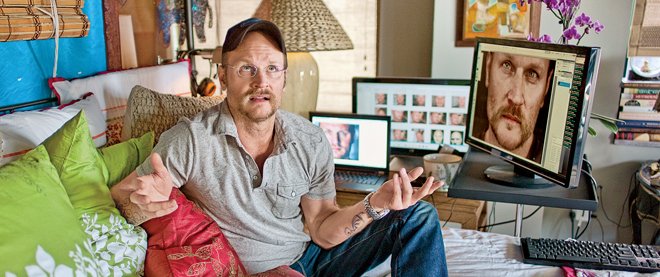Augusten Borroughs’ anti-self-help book
The American memoirist says affirmations are absurd and truthfulness is medicinal
Share

Repeating positive affirmations such as “I’m a loveable person” may boost the spirits of already happy people, but it can leave sad people feeling worse, according to research by psychologists at the University of Waterloo and the University of New Brunswick. It made perfect sense to American memoirist Augusten Burroughs when he read about the study in 2009.
In an interview last week, Burroughs said the Canadian findings went “right into what I instinctively felt, which was that affirmations are completely absurd.” The research is the starting point for Burroughs’s new book, a truly different self-help guide called This is How: Proven Aid in Overcoming Shyness, Molestation, Fatness, Spinsterhood, Grief, Disease, Lushery, Decrepitude & More.
“The truth is, it is not going to help to stand in front of a mirror, look into your own eyes, and lie to yourself,” he writes. Burroughs would know. His 2002 bestseller Running With Scissors is a fearlessly honest account of a bizarre childhood with a mother who sent him to live with her psychiatrist; its follow-up, Dry, is a squirmingly detailed account of his near fatal addiction to alcohol.
In his new book, he says he was in rehab when he first realized affirmations are “the psychological equivalent of sprinkling baby powder on top of the turd your puppy has left on the carpet.” Never one to mince words, Burroughs writes that too many people don’t want to admit to themselves or others that they are feeling distressed, “so it’s chin up and sprinkle, sprinkle, sprinkle.”
Burroughs urges readers to wipe the pretend smile from their faces and get in touch with their feelings. “Truthfulness itself is medicinal,” he writes. “Without accuracy, you can’t expect to manifest large changes.’ If you’re angry at a friend, talk about it, he advises. Just don’t yell. “See the anger for what it is: fuel. Pissed-off people can accomplish a lot if they don’t spray their rage fuel all over the place but instead use it to power a novel or a business plan or something else productive.”
However, if you feel burning hatred for somebody, see a therapist. “Not because feeling hatred is abnormal or a sign or mental illness but because it’s powerful and complex. It’s also highly corrosive, so without the insulating, protective container of therapy, hatred can eat a hole right through the centre of your life.”
In a chapter on suicide, Burroughs recounts how he once held a razor to his wrist. He hated his life and wanted to punish those who’d made him miserable, but realized that suicide wouldn’t accomplish his goals. “It wasn’t that I wanted to kill myself. What I really wanted was to end my life.” That didn’t mean he had to die; it meant changing his life.
“It meant I could change my name from Chris to something more alphabet-dominant: Augusten. As far as last names were concerned, I could toss my father’s creaky old rundown Robison right into the trash pit. I could pick myself a brand new last name.” Burroughs named himself after the Burroughs Series E 1400 Electronic Computing/Accounting Machine.
When your life reaches a state of emergency, he tells readers, start a new one. “If you hate your life, it’s because your life is too small and doesn’t fit you.”
Burroughs tells how he gained confidence by expressing his thoughts. He remembers a time when he couldn’t even form an opinion, “because if I admitted liking something the person I was speaking with disliked, I would have felt profound rejection.” He began pushing himself. “When people talked about a movie or a song and I felt differently, I started to express this . . . I did not go into the impossible, anxious territory of, ‘They must think I’m uncool for liking that movie.’ ” After all, confidence isn’t about ability, he writes, it’s about not caring what other people think of you. “Unscripted, unedited and wholly authentic people are almost always universally admired, especially if they have flaws and aren’t afraid to make live, red-blooded mistakes. Messing up is how you tell other people, ‘It’s okay to like me because I’m just like you.’ ”